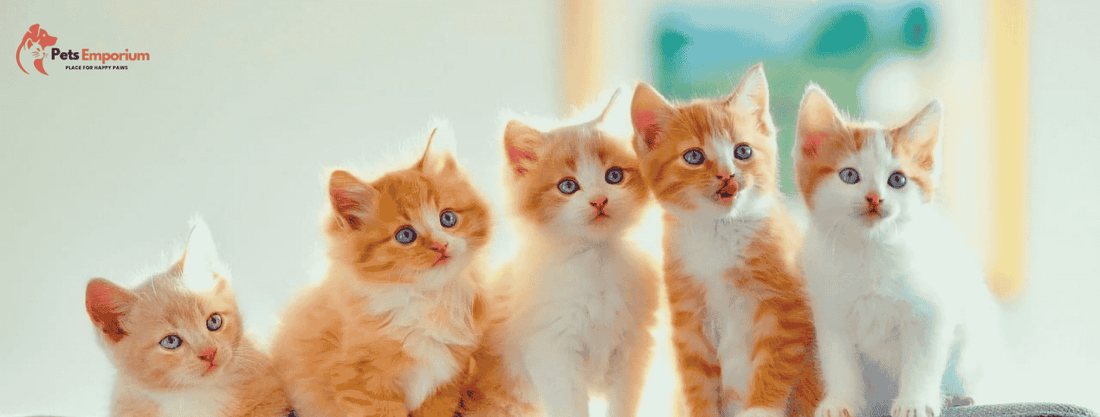Cats are more than just pets; they're family. As pet ownership rises across Pakistan, more people are paying attention to what their furry companions eat. A healthy lifestyle begins with the proper nutrition, especially for active cats that need energy to play, explore, and thrive. Each feline is unique, and their food should match their lifestyle. Excellent nutrition helps support strong muscles, healthy coats, and overall well-being. In this article, we will explore the basics of cat nutrition, the growing love for pets in Pakistan, and how PetsEmporium supports feline owners in choosing the best diet for their active feline friends.
Nutritional Needs of Active Cats
Active cats consume a lot of energy during their play time, after which they require balanced nutrition to keep them fit and lively. These pets need quality proteins, good fat, as well as vitamins to meet their active life. It is also essential to make them drink enough water, particularly when they consume a large quantity of dry food.
The balanced diet helps them in maintaining muscles, a shiny coat and a strong immune system. It is essential to maintain a proper schedule for feeding them. Special attention should be given to the selection of the food that provides them with energy. In any case, it is essential to always consult with a vet to ensure that your feline is being supplied with the type of nutrition that will match its level of activity.
Emerging Role of Protein in a Cat’s Diet
Protein is also an essential ingredient as far as the health of a feline is concerned. Being natural meat-eaters, these pets need protein to develop muscles, to keep their energy levels, and to sustain their system.
According to the latest research, increasing protein intake can reduce weight and improve body condition. The protein must be of good origin, too, as meat, poultry, or fish provide the amino acids that the cat requires. Eating the proper protein makes them fit and energetic.
You should also always read the label and prefer food that contains real meat as one of its first ingredients. To achieve the best results, consider discussing with your vet the recommended level of protein.
Essential Benefits of Protein-Rich Diets for Active Cats
Builds Lean Muscle Mass
Active felines require muscle strength that helps in their daily activities of jumping, running and playing. Consuming a high number of proteins helps develop lean muscles and maintain them. It promotes general fitness and activity, helping your feline be both fit and energetic during the day. Hence, it is overall essential for the long-term health of the feline’s body.
Supports a Healthy Weight
Protein will make your feline feel complete and hungry longer. This reduces the chances of over-eating or of seeking more food to eat. Similarly, it is one of the ways to control weight naturally without strict limitations. It is of great benefit for the active feline as they burn a lot of calories and require constant energy to be supplied by balanced meals.
Improves Coat and Skin Health
Protein is also essential for having a bright coat and healthy skin. It helps repair cells and grow fur, which makes your feline have a fuller and fluffier coat. These pets also experience increased wear and tear, and good nutrition is essential to keep them in tip-top condition.
Boosts Immune Function
A meal that is rich in protein boosts your feline immune system. It helps in forming antibodies to deal with different infections and diseases. The feline who goes out or plays a lot will remain healthy and recover faster after any minor illnesses.
Promotes Healthy Digestion
Protein is of high quality, and therefore, felines can easily digest it without fillers or grains. It causes fewer stomach problems and hard stools. Active felines require food that is effective for their high metabolism. Thus, protein helps their system to digest and process food more effectively.
Increases Daily Energy
Protein is a good source of energy with which your kitten can maintain its active lifestyle. This makes them jovial, active and attentive all through the day. Lack of sufficient protein may result in a decline in energy levels, rendering your kitten tiring or sluggish. A healthy feline with a high energy level needs stable protein.
Risks of Overfeeding or Imbalanced Protein Intake
Feeding the feline a large amount of protein is a significant mistake which many pet owners make. This overfeeding can cause a few significant risks such as:
-
Weight gain and obesity
-
Pressure on the kidneys
-
Poor coat health
-
Digestive system upset
-
Reduced energy levels
Overfeeding or providing an insufficient portion of protein may be harmful to the health of your kitten in the long term. Stress and strain on joints are caused by extra weight, resulting in diabetes. Excessive protein, particularly of low quality, may overload the kidneys and mess up the digestive system.
An unbalanced diet can also make their coat dull, hence they lose their energy. Look at the food label, and the feeding guidelines are to be followed consistently. Discuss with your vet what the right level and source of protein is required by your feline.
Tips for Introducing Protein-Rich Food to Your Cat
If you are feeding your pet protein-rich food for the first time, there are specific tips which you should follow. This includes:
-
Start with small portions
-
Mix with the current food
-
Choose quality meat sources
-
Monitor for any changes
-
Keep feeding time consistent
Introducing your feline to protein in the diet needs to be done cautiously. Start by combining some of the new food with their regular meals. Ingredients should be of real meat and of good quality to achieve better results.
Observe their behaviour, faeces and fur. When they respond favourably, gradually add to the dose. It is essential to follow a routine feeding schedule where such things as fussiness or stress are avoided.
In case you are not sure what to feed your feline, it is best to consult with your vet. They will suggest to you the proper diet based on the age, weight and lifestyle of the feline.
Conclusion
Protein plays a key role in keeping active felines strong, healthy, and full of energy. Choosing the right food, especially in Pakistan’s unique climate and lifestyle, makes a big difference in your cat’s well-being. It’s also important to schedule regular vet checkups and review your pet’s diet as their needs change. At PetsEmporium, pet owners can find trusted products and guidance to help their feline live a happy, active life every day.
Frequently Asked Questions
1. How do I know if my cat needs a high-protein diet?
Active, playful, or younger cats often require more protein. Signs include high energy levels, strong muscles, and quick recovery from activity.
2. Can I feed my cat meat from the kitchen instead of commercial food?
While meat is good, it lacks essential nutrients like taurine unless properly supplemented. It's safer to rely on balanced commercial food unless guided by a vet.
3. Are high-protein foods safe for older cats?
It depends. Older cats with kidney issues may need moderate protein. Always consult your vet before making dietary changes for a senior cat.
4. How much protein should be in my cat food?
Look for a minimum of 30–40% crude protein in dry food for active adult cat. Wet food varies, but it should list a high meat content.

